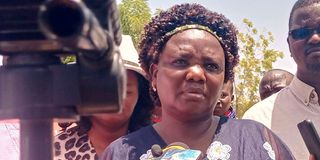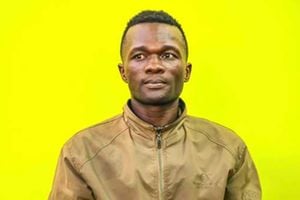Beatrice Askul's Cabinet nomination an inspiration to Asal women

Beatrice Askul Moe at an event on October 14, 2023. She is the first Turkana woman to land a Cabinet position.
What you need to know:
- Asal communities are largely patriarchal and men hold sway even in leadership positions.
- Turkana women leaders say Ms Askul's Cabinet position would offer hope to women and inspire girls.
Turkana is among the pastoral communities in Kenya where patriarchy dominates. Men hold positions of dominance and privilege.
The situation is highly visible in politics because for Turkana County, Lodwar Township Member of County Assembly Ruth Kuya and Woman Representative Cecilia Ngitit are the only elected women.
Two-term Woman Representative Joyce Emanikor, after relinquishing her seat, unsuccessfully vied for Turkana Central parliamentary seat that was won by Namuar Emathe in the last general election.
She had, through National Government Affirmative Action Fund and partnership with various organisations, including the Kenya Women Parliamentary Association, been at the forefront of championing to have more women vie for MCAs, MPs, senator and governor.
The call yielded only two positions. However, the nomination of Ms Askul, a social scientist and consultant, by President William Ruto as Cabinet Secretary for East African Community Affairs and Regional Development, now offers inspiration to more women.
After approval by the National Assembly, she will become the first woman from Turkana to join the Cabinet, a position that will inspire women from pastoral communities to courageously go for big positions that have been held by men for decades.
Turkana women leaders say Ms Askul's Cabinet position would offer hope to women in Asal counties, where, despite being patriarchal, women remain resilient.
Ms Ngitit says besides being historic, Ms Askul's nomination is evidence of President Ruto's progressive and generous gesture for women's emancipation.
“The nomination demonstrates a strong commitment to gender equality and inclusion in his administration.
“I am completely confident in her competence to steer the Ministry of East African Community Affairs (EAC) and Regional Development to greater pinnacle," Ms Ngitit says.
Turkana Tourism Executive Leah Lokala describes the nomination as a godsend and a sign of hope for the girl child and aspiring women leaders. “It is ‘uhuru’ for us.”
Ms Penina Topole, who unsuccessfully vied for a ward seat in Turkana South, says both President Ruto and ODM leader Raila Odinga have proved that they have trust in the potential of women from marginalised communities.
"I call on officials and allies to borrow a leaf and be giving potential women a chance to easily get party tickets and positions of power. I call on development partners to actively fund public awareness forums to eliminate the deeply rooted patriarchy in society so that men in remote areas can accept women in decision-making or leadership positions,” says Ms Topole, a member of the Turkana Professional Association.
She says patriarchy promotes poverty at household levels, and stifles development in remote areas, where women are culturally assigned childcare duties and have no reliable sources of income.
This is evident at villages in pure pastoral zones where livestock keeping is the main source of livelihood but women have no say over the family livestock.
“Such social norms have seen many women remain poor and vulnerable from one generation to another, with begging and relief food being their only hope as they are not supposed to sell any livestock to buy food without the permission of men. The men, on the other hand, keep livestock for prestige as one with large herds earn more respect,” Ms Topole explains.
Women like Ms Naroo Nachwae, a 23-year old mother of four from Kaikor village in Turkana North, are, however, on a mission to break the barriers that lock them out of dignified lives.
“My children are growing each day and it is obvious that I can't just sit and continue begging for food when I personally can make a decision of finding an alternative way of bringing food on the table. I can't rear livestock because during drought, I must migrate with my children in search of water and pasture. The soil can't support subsistence farming, and, therefore, I am left with the option of enrolling for the Ujuzi Mashinani programme," Ms Nachwae says.
The programme, supported through USAID Nawiri, targets the youth by equipping them with technical employability skills, thus enhancing their ability to lead decent lives by addressing household needs and improving nutrition outcomes.
“Three months ago, I opted to enrol for electrical training as our centre was fast developing with permanent shops and modern public facilities like schools, hospitals, water system. With availability of electricity, my services will come in handy in this community," Ms Nachwae explains.
She said that in the whole centre, there is no electrician and schools or traders must seek such services from Lodwar, more than 200 kilometres away.
Armed with her newfound expertise, she is confident in her ability to cater to her family's needs and enhance their dietary variety when she finally graduates. She hopes to spend most of her income in improving the nutritional and overall wellbeing of her family.
Ms Maximilla Atabo, on the other hand, is seeking to improve her traditional hairdressing skills to serve the growing needs of modern hairdressing services by women from major towns and even outside the county, including civil servants or those on field assignments.
“At first, my hairdressing skills were limited to simple cornrows, but I was eager to improve. This training is fantastic—it covers everything from hair washing and treatment to intricate braiding and colouring,” Ms Atabo says.
“People in the village are now fascinated by my diverse hairstyle skills that I have acquired through training. I inspire even schoolgirls to pursue hairdressing training too while on school holidays.”
Turkana Deputy Governor Dr John Erus says the programme is helping Ms Atabo, Ms Nachwae and 1,705 other youth from Turkana North and Turkana South to improve their standards of living.
“Ujuzi Mashinani represents a joint investment of Sh74 million and Sh67 million, by USAID Nawiri and the county government respectively. The collaboration is ensuring that youths have the necessary technical skills for sustainable livelihoods," Dr Erus says.
“Ujuzi Mashinani aligns with Turkana County Government's development agenda number 5 on revitalising education and ensuring its accessibility for all.”





